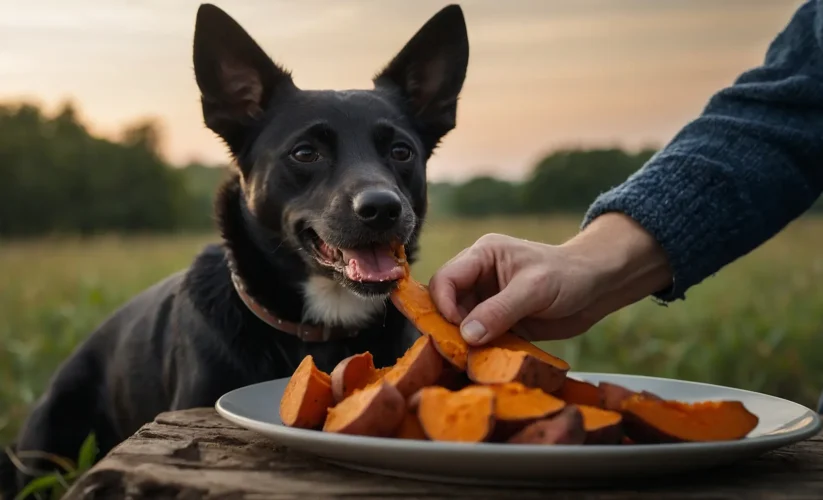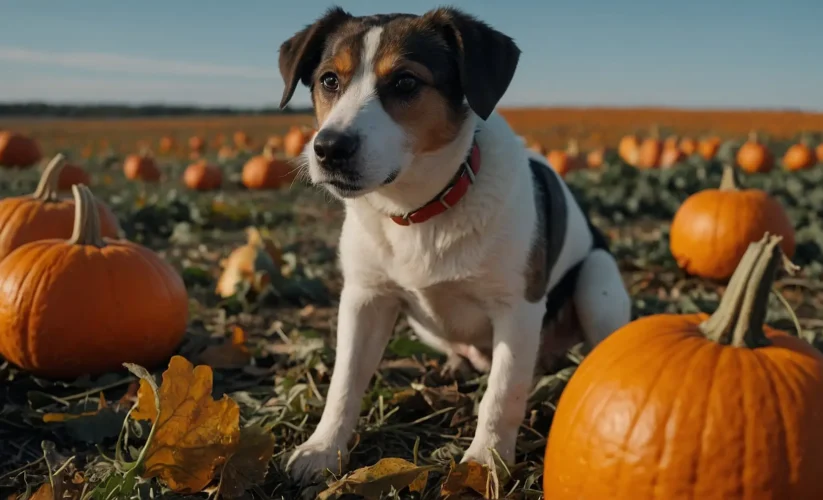Can Dogs Eat Sweet Potatoes?

In the quest to provide our furry friends with the best possible diet, dog owners often explore the inclusion of various fruits and vegetables. “Can Dogs Eat Sweet Potatoes?” is a question that arises frequently due to the vegetable’s rich, vibrant color and myriad of health benefits for humans. This starchy, sweet root vegetable is not only a staple in many human diets but also frequently pops up in discussions about healthy treats for dogs. As an experienced dog blogger and a devoted dog owner, I’ve delved into the world of canine nutrition to bring clarity to this topic. In this post, we’ll explore the nutritional benefits and potential drawbacks of sweet potatoes in a dog’s diet, compare them with other vegetables, and ultimately, provide a well-rounded perspective to help you make informed decisions about your dog’s health.
Is Sweet Potatoes Good for Dogs?
Sweet potatoes are indeed beneficial for dogs, when given in moderation. This nutrient-rich vegetable is a powerhouse of dietary fiber, which aids in digestion and promotes a healthy gut. Additionally, sweet potatoes are loaded with essential vitamins such as A, C, and B6, along with minerals like potassium, which are crucial for maintaining your dog’s overall health. Vitamin A, for instance, is vital for eye health, immune function, and skin and coat maintenance.

The high dietary fiber content in sweet potatoes can also contribute to the feeling of fullness, potentially helping in weight management for dogs prone to obesity. Moreover, the natural sweetness of sweet potatoes makes them a favorable treat among our canine companions, offering a healthier alternative to processed treats that may contain added sugars and fats.
However, it’s important to introduce sweet potatoes to your dog’s diet gradually. Starting with small amounts and observing your dog’s reaction can help mitigate any adverse effects, such as gastrointestinal upset. Cooked sweet potatoes, without any added seasonings or sugars, are the safest and most digestible form to offer to your dog.
Is Sweet Potatoes Bad for Dogs?
While sweet potatoes can be a healthy addition to a dog’s diet, there are circumstances where caution is warranted regarding “Can Dogs Eat Sweet Potatoes.” First and foremost, due to their high carbohydrate content, sweet potatoes should be given sparingly, especially to dogs with diabetes or weight issues. The sugars in sweet potatoes, although natural, can contribute to these health concerns if consumed in large quantities.
Another potential concern is the risk of choking or intestinal blockage, particularly with raw sweet potatoes. Their hard, dense texture can be difficult for dogs to chew and digest, posing a risk especially to smaller dogs or those with existing dental issues. Thus, it’s crucial to cook sweet potatoes thoroughly and cut them into appropriate sizes before offering them to your pet.
Additionally, sweet potatoes contain oxalates, which can lead to kidney and bladder stones in dogs predisposed to these conditions. While the risk is relatively low, it underscores the importance of moderation and consulting with a veterinarian if your dog has a history of urinary tract issues.
Are Other Vegetables Like Safe For Dogs?
Beyond sweet potatoes, a variety of other vegetables can be safely incorporated into your dog’s diet, each offering its own set of benefits. Cucumbers, for instance, are low in calories and high in water content, making them a perfect, crunchy snack for dogs, especially those needing to lose weight. Spinach, though nutritious with high levels of vitamins A, C, and K, iron, and antioxidants, should be given in limited quantities due to its oxalate content, which, as mentioned with sweet potatoes, can contribute to kidney issues.
Peas are another excellent addition, rich in protein, fiber, and vitamins A, B, and K. They can be given fresh, frozen, or cooked, but it’s advisable to avoid canned peas due to added sodium. Each of these vegetables can contribute to a balanced diet, offering a range of nutrients and benefits for your dog. However, as with any dietary addition, moderation is key, and it’s essential to monitor your dog for any adverse reactions when introducing new foods.
Final Thoughts
Incorporating vegetables like sweet potatoes into your dog’s diet, as explored in our discussion on “Can Dogs Eat Sweet Potatoes”, can offer a range of health benefits, from improved digestion to vital nutrients for overall well-being. However, the golden rule of moderation cannot be overstated. It’s crucial to balance these treats with a comprehensive, nutritionally complete diet suited to your dog’s specific health needs and to consult with a veterinarian when making significant changes to their diet.
Vegetables can provide a healthy, low-calorie way to reward your dog while contributing to their nutritional intake. By choosing the right vegetables and preparing them safely, you can enrich your dog’s diet with valuable nutrients and variety, enhancing their health and happiness. Sweet potatoes, along with cucumbers, spinach, and peas, can all be part of a healthy canine diet when given correctly, making them excellent choices for thoughtful dog owners looking to offer their pets a little something extra.










